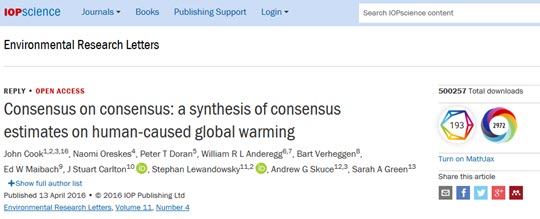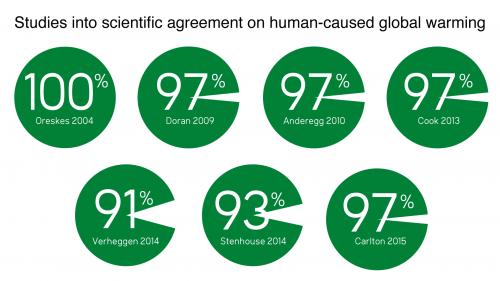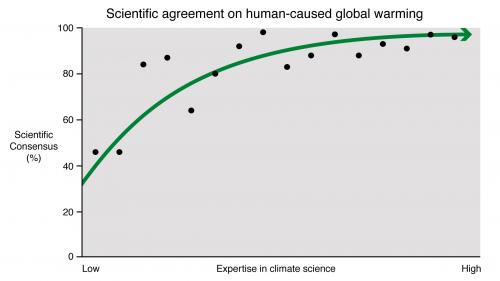
In 2013, the Skeptical Science team published a study in Environmental Research Letters finding 97% scientific consensus on human-caused global warming. However, we weren't the first researchers to find overwhelming scientific consensus, nor were we the last. In 2016, we teamed up with authors of six other consensus studies to publish Consensus on consensus: a synthesis of consensus estimates on human-caused global warming. This week, our Consensus on Consensus study just went past 500,000 downloads.

Replication is the heart of the scientific method. When multiple scientific studies, using independent methods, all arrive at similar conclusions, we become more confident that our scientific understanding is correct. This is why scientists are so confident that humans are causing global warming: multiple lines of evidence all find human fingerprints in climate change. In the same way, we know there is a scientific consensus because multiple studies independently find overwhelming scientific agreement that humans are causing global warming.
So I was always bemused by the fact that our 2013 consensus study received so many attacks, as if this would singlehandedly overturn the 97% consensus on human-caused global warming. This sentiment is most explicitly articulated by Senator Ted Cruz who argued that the 97% consensus was based "on one bogus study." The simplest retort to this argument is that the 97% consensus has been confirmed by multiple studies, including Doran & Zimmerman 2009, Anderegg et al 2010, and Carlton et al. 2015.
So imagine our surprise when Richard Tol, who threw critique after critique at our 2013 consensus study, unveiled a new line of attack: our 97% consensus was an outlier compared to other studies. This was a valiant attempt at ju jitsu, turning the strongest element of our research (consistency with independent studies) into a potential weakness (claiming our research conflicted with other studies). However, in order to make this argument, Tol misrepresented the other consensus studies beyond recognition, much to the indignation of the authors of those studies.
While Tol's egregious misinformation is problematic, it did inspire the authors of seven leading consensus studies to collaborate on the Consensus on consensus study. We summarized the level of agreement among climate scientists on climate change - establishing that no matter how you approach it, there is overwhelming agreement that humans are causing global warming. And now that the study has been downloaded a half million times, you could argue that Tol's efforts have led to raising awareness of the robust nature of the consensus on climate change.

The other important contribution of Consensus on consensus was shining disinfecting sunlight on a common strategy used to cast doubt on expert consensus: the fake expert technique. This involves citing people who convey the impression of expertise but don't possess the relevant expertise on a specific scientific matter. The tobacco industry perfected this technique in advertisements citing general scientists, doctors, or educators - people who convey the impression of expertise but have never actually researched the health impacts of smoking.

In Consensus on consensus, we showed that agreement on human-caused global warming increases with expertise in climate science. This means that if one cherry picks sub-groups of scientists with less expertise in climate change (e.g., economic geologists), you can obtain lower levels of agreement. When you hear of a scientific group with low levels of agreement on human-caused global warming, this group consists of fake experts. Tol used this technique by selecting sub-groups of non-climate-experts from various consensus studies, to argue that they found lower consensus than 97%.

While much of my research has been spent on quantifying the consensus, even more of my work has focused on communicating the consensus. Two of my experimental studies, Rational Irrationality and Neutralizing misinformation through inoculation, demonstrated how effective communicating the scientific consensus is in raising awareness of the reality of climate change and neutralizing misinformation. However, these two studies are only two amongst a much larger body of evidence confirming the efficacy of communicating the consensus. This is why I created a Consensus on Consensus Messaging post summarizing the research into consensus communication. Communicating the consensus is an important part of raising climate literacy and building public support for climate action.
Posted by John Cook on Monday, 2 September, 2019
 |
The Skeptical Science website by Skeptical Science is licensed under a Creative Commons Attribution 3.0 Unported License. |